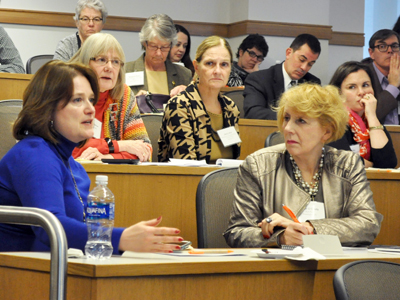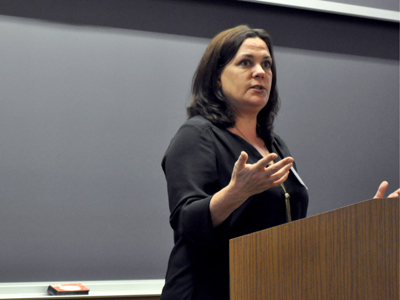BU Law Hosts National Conference on Copyright of State Legal Materials
Conference examined the status of legal protection for state materials and fostered initiatives promoting instructive use of public records.

US law states that federal materials cannot be copyrighted, but that rule does not apply to state law or materials commissioned by federal, state, and local governments. Or, does it? New wrinkles are created by standards organizations that spend time and money creating model provisions that are often adopted into law. When state agencies and external organizations assert copyright over materials used in the law, serious questions arise over what constitutes access to public documents and how historians, legal scholars, and journalists may gain access to and use public resources.
With the goal of exploring questions like these, Boston University School of Law teamed up with the American Association of Law Libraries (AALL) to host the National Conference on Copyright of State Legal Materials.
Ron Wheeler, director of BU Law’s Fineman & Pappas Law Libraries and president of the AALL, invited copyright scholars, legal librarians, and policymakers to examine the status of legal protection for state materials and foster initiatives that promote the creative and instructive use of public records. Panels throughout the day featured organizations creating new tools that incorporate state legal sources, and explored legal theories of ownership and the challenges to providing access to state legal materials.

Corynne McSherry, legal director at the Electronic Frontier Foundation, explored problems with access to the law in her opening keynote. Technology has created new possibilities for improving access to the law, she noted, but also given rise to new questions that plumb the grey area of copyright of state legal materials. “Copyright is a broad right to control access and distribution in many circumstances,” she said. “These are all things that make sense when you’re talking about books and movies, but create a lot of problems when you’re talking about the law.”
Take, for example, regulations like the national electrical code, national fire safety codes, and a whole web of regulations that deal with safety and the environment. These standards are often written by private standards organizations, which bring together volunteers and government officials who are experts in a given industry and develop rules and standards for that area. Those standards are often incorporated into the Code of Federal Regulations by reference, rather than wholesale adoption which would only expand a document that is already thousands of pages long.
Once the regulations are adopted, they are required to be “reasonably accessible.” In practice, McSherry notes, this means you can buy them from the organization, and if you can’t afford that, federal and state laws usually require a copy be deposited with the adopting agency or a library. “In a digital age, this is not reasonable accessibility,” she said.
While standards organizations argue that open access projects violate their copyright as authors of these regulations, McSherry asserted that access to the law is core to free speech, allowing, for example, a journalist to investigate a burst pipeline to research if that pipeline was built to code.
“If a government made a bargain that trades away the citizens’ rights of access to the law,” she said, “that bargain doesn’t stand.”
Picking up on that theme, Sarah Jeong (’06), a contributing editor at Motherboard who covers the intersection of law and technology, emphasized the importance of knowing when litigation moves so she can decide what is newsworthy. “When it comes to journalists, access is an issue much broader than copyright,” she said. “Journalists are covered by fair use in pretty much all cases, but the state of access to the law is a disaster.”
While there are subscription-based databases that allow journalists to search public records, such as Public Access to Court Electronic Records (PACER), they are often expensive and are built with interfaces that make it difficult to search effectively. As difficult as these services are to access and use, Jeong noted, it is far more difficult to access records from state courts. The disparity leads to an overall bias toward reporting on federal rather than state cases.
“Every day, huge stories are passing under the radar because access to this information is restricted,” she said. “Better access to legal materials is a moral imperative, but it also leads to better journalism, which means better democracy.”
